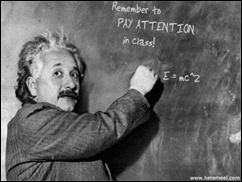
At one time or another we all have to sit exams, and unfortunately there is no magic short-cut to doing well. While a few lucky individuals may sail through with little effort, the majority of us have to work hard to achieve our modest results. However, we are all capable of doing much better than we may believe by rethinking our approach to studying.
While I don’t consider myself to be especially intelligent, I also don’t consider myself to be particularly stupid. As such I did OK at school, with my exam marks hovering around 65%; not A grade material but a respectable B.
Following school I went on to study Electronic Engineering at University, firmly believing that I would continue along similar lines and graduate with a 2.1 degree. My first three years at college went as anticipated, with my marks averaging around 65%. However, prior to my final year I had an epiphany which transformed my entire approach to studying and resulted in me exceeding my wildest expectations in my finals.
Stage 1: Setting your Goal

Photo courtesy Chutiporn Chaitachawong
In the Summer holidays prior to my final year at university I caught up with a friend who had studied the same course as me a few years previously, and who graduated with a first class honours degree. For some reason this lodged in my mind, and I began to entertain the idea of getting a first. If I had not started to consider this as a very real possibility I would certainly never have achieved it.
Believe in Yourself
The first steps to achieving are to have a goal, to believe in yourself and to dedicate yourself to the task ahead.
I would never have believed that I was capable of achieving my aim initially, but I decided to focus myself 100% to my new goal of getting a first class honours degree.
Step 2: Exam Strategy
Strategy: a plan of action designed to achieve a vision
After having set my “vision”, my first tactic was to choose my final year courses.
If all of the exams / courses that you plan to take are predetermined, then unfortunately you have no other choice at this stage than to knuckle down and get on with things. If you do have a choice then consider very carefully, as your decisions at this stage are more fundamental than you think. Your initial preferences may not be as logical as you first thought.
Choose your Topics Wisely
 I chose Mathematics as one of my final year modules. Most of my fellow students thought I was mad as they couldn’t wait to ditch the subject. My logic was different. While Mathematics wasn’t my strongest subject, I knew that it was technically possible to get 100%; the answers are either correct or incorrect.
I chose Mathematics as one of my final year modules. Most of my fellow students thought I was mad as they couldn’t wait to ditch the subject. My logic was different. While Mathematics wasn’t my strongest subject, I knew that it was technically possible to get 100%; the answers are either correct or incorrect.
Compare this to more descriptive subjects. Such subjects are usually easy to pass with reasonable marks, yet are difficult to excel in as the answers can be subjective. Results in such subjects may depend heavily on the person marking the exam and their personal perspectives.
While I may have made life a little more difficult for myself, I was playing the game with my ultimate goal in mind. A little initial pain could pay dividends in the long run where every mark would count.
Step 3: Let the Work Commence
I am afraid that there is no getting around it, you are going to have to do some work, and if you want to step things up a gear it is going to have to be sustained and consistent work.
Changing the Game
Throughout my school and college years I religiously attended lessons, copied down what the teacher put on the board, completed the appropriate homework and sixth months later would dig out my notebooks to revise furiously like every other petrified student in exam season.
Although the majority of students follow this approach it is not the best way of doing things. While this method can lead to satisfactory results, it is unlikely to help the average student excel. So, in my final year I decided to adopt a completely different strategy.
Pay Attention in Class
 Every lesson that I attended I copied down what the teacher wrote on the board just as before, but this time I also listened intently to what the teacher actually said and made additional notes from their comments.
Every lesson that I attended I copied down what the teacher wrote on the board just as before, but this time I also listened intently to what the teacher actually said and made additional notes from their comments.
After a while you can begin to pick up clues as to a teacher’s pet topics. If the same teachers are going to be the ones setting and marking the exams, this can prove to be significant information for your later revision plans.
Homework
Even if I hadn’t been given any formal homework, every evening I would read through the day’s notes ensuring that I completely understood the topics in question. I also made additional notes to myself to help explain things in my own way; a vital tool for later revision.
If I wasn’t certain about anything I would read the relevant textbook. Teachers are creatures of habit and often favour one or two particular textbooks. Listen to their recommendations! Some of the lazier teacher’s notes might even came straight out of a textbook word for word.
After my evening’s studying, if there was anything that I still didn’t understand, I would ask the teacher to clarify it at the next lesson. Following this process I was ensuring that I actually understood the subjects at a fundamental level, so if any exam questions were phrased in an obscure or abnormal way I would be able to cut to the root of the problem and answer the question.
Step 4: Revision Tactics
At this point you shouldn’t be doing too badly. You made the best choice of topics to study from a strategic viewpoint and have worked consistently throughout the year so that you actually understand the topics.
Refresh your Memory
A few weeks before the exams begin is a good time to start reading through your notes again to refresh your memory. At this point your previous efforts should start to pay dividends. If you really understand something it is much easier to recall, as you are not working from memory alone but a deeper cognitive grasp of the subject.
Past Papers

Photo courtesy Horacio Valdez
Repetition is vital. The more you do something the easier it becomes, until eventually becoming second nature. The more examples of past exam papers that you can do, as well as revisiting old “homework” questions, the better. If you can get the answers to past papers, so that you know when you have things right, better still.
Exam papers often follow standard patterns, particularly if you’re being taught by the same person setting the exam. If you do enough past papers then you shouldn’t encounter any nasty surprises when you step into the examination room and open the question paper for the first time.
Final Revision
Having got this far you should know your subject inside out. All that remains is to read through your notes one last time the night before your exam, and make quick reference notes, such as key phrases, dates, formulae etc. on a single sheet of paper. This reference sheet is useful to cram key information into your short term memory an hour or so before the exam.
After a sound night’s sleep and a good breakfast use your sheet of notes to lodge any vital facts into your short term memory; it only needs to stay there for an hour or two!
Step 5: The Exams
After all of your hard work you will ultimately have to sit the exam. You shouldn’t be nervous as you’ve poured everything you have into this moment. The exam will only be set on things you have studied, so if you have done your homework and actually understand the subject, the exam is a mere formality.
 My finals were the first set of examinations that I actually felt confident about and fully prepared for. When I opened the exam papers nothing came as a surprise; I’d been preparing for this moment for the best part of a year and it paid off.
My finals were the first set of examinations that I actually felt confident about and fully prepared for. When I opened the exam papers nothing came as a surprise; I’d been preparing for this moment for the best part of a year and it paid off.
The Results
No matter how much you prepared and how well you think you did, results day is still intensely nerve-racking. Self doubt creeps in; did you do enough, did you interpret the questions correctly?
For me, I surpassed my wildest expectations. Not only did I get the 1st Class Honours Degree that I aimed for, but I also got the highest marks in the year with an average of over 90%.
You CAN Do It!
I’m not posting this article to boast but hopefully to inspire you to aim a little higher, and to push yourself a little further, and believe in yourself. I am NOT a naturally gifted student, but with serious application and dedication I proved that we are all capable of achieving more than we give ourselves credit for.
A Second Opinion
Don’t just take my word for it though. At the same time as me one of my best friends was also taking the same exams and similarly decided to aim for a first. He also was not a naturally gifted student and under normal circumstances would probably have come out with a 2.1 degree. We both had one goal in mind and focused 100% on achieving it, and we both achieved that goal.
If two average Joes can do it, so can you. Don’t take no for an answer. Don’t listen to people who put you down and say you can’t achieve your goal. Have your goal, focus on it 100% and GO FOR IT! It won’t be easy, but it is possible.
Good Luck.

My favourite is “Past Papers”, sometimes I am even able to guess complete questions using this technique.
Past Papers are indeed an invaluable tool for exam preparation, definitely one of the most important (assuming you’ve done your revision and actually understand your subject), they help to consolidate everything.